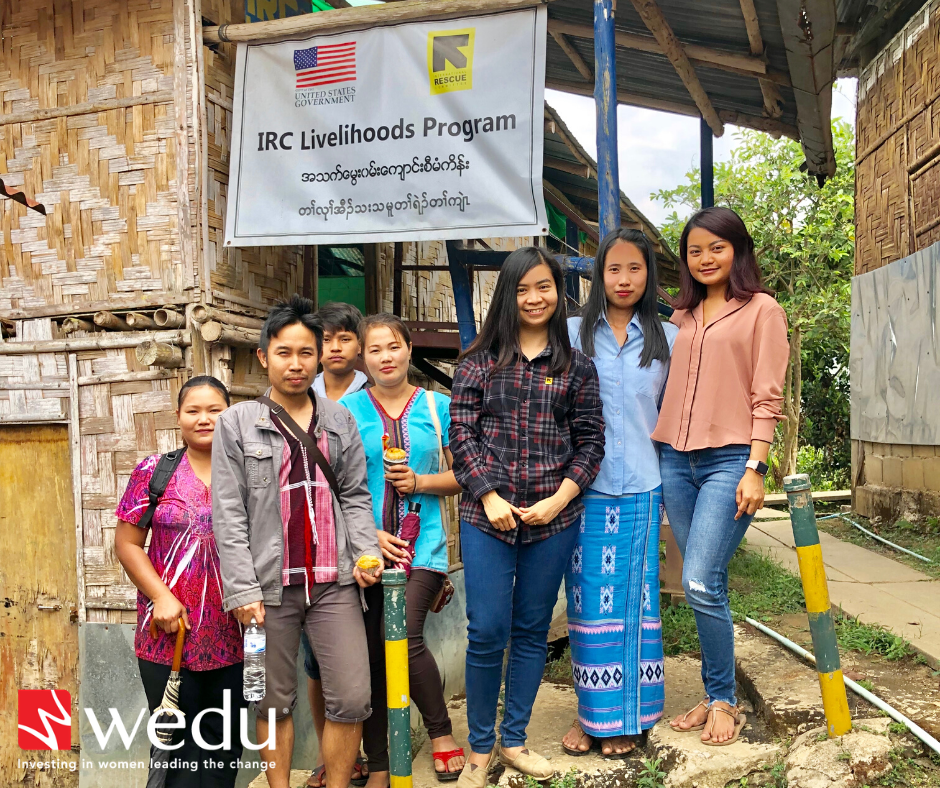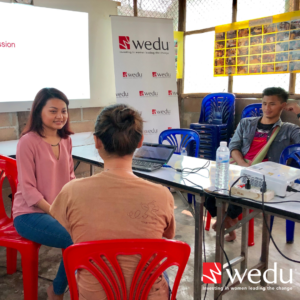
26 Jun Planning for an uncertain future: insights and lessons from working with refugee women from Myanmar by Tchissole Carvalho
Working with refugees has been one of the most rewarding and grounding professional experiences I have had. In the last three years, I visited three refugee camps in Thailand to work with women refugees. Here are my reflections on that experience.
Supporting young women refugees planning for an uncertain future
According to UNHCR, as of March 2020, there are 93,227 refugees living in 9 refugee camps in Thailand. Most refugees are ethnic minorities from Myanmar, mainly Karen and Karenni. Every refugee is in the pursuit of freedom, safety, stability and the opportunity to plan a future for themselves and their families. The International Rescue Committee in Thailand (IRC) and Wedu partnership initiated in 2017 to empower women and girl refugees, by strengthening their leadership skills and plan their future The IRC is a non-governmental organisation that responds to the world’s worst humanitarian crises and helps people whose lives and livelihoods have been shattered by conflict and disaster to survive, recover and gain control of their future. The displaced people living in the temporary shelters rely on organisations like the IRC for support in critical areas such as skills training, healthcare and legal protection.
 The programme impacting 50 refugees (mostly Karen) had three key components:
The programme impacting 50 refugees (mostly Karen) had three key components:
- Goal Setting – Aspirations need an action plan. It is overwhelming to plan for an uncertain future and taking a step by step approach can be the key to start. At the initial phase, all participants learned the powerful SMART goal setting technique to help them with this process.
- Mentoring – A good mentor can help a young refugee to seize opportunities and explore new possibilities. Every woman was matched with a dedicated Wedu mentor for eight months (online) to support and guide her.
- Leadership Development – Each challenge is personal and each journey is unique, hence the tools and resources Wedu offers are capable of supporting each woman no matter where they are in their leadership journey.
I now have a better grasp of the specific challenges facing refugees (and in particular women and girls), and deeper regard for their struggles. I reflect on my personal insights leading the successful partnership in the three refugee camps of Mae La, Nupo and Umpiem Mai in the Thai-Myanmar border.
 Each story is unique, take time to listen
Each story is unique, take time to listen
Before working with refugees, I assumed that most refugees stories were very similar. I was wrong. Over the years, I visited the refugee camps several times and had the privilege of spending quality time with the refugee women and learning about their personal stories. Many of these conversations took place over lunch or hanging around after sessions. Some women shared about the time they became refugees in adolescence and still had vivid memories of life back home, others were born a refugee and inside the camp with little references to the outside world.
I was particularly impressed by Esther. She was a trained midwife living in the Umpiem Mai camp and worked in the family centre supporting pregnant women and new moms. Esther was extremely committed to her community, with very good English skills and was very resolved to continue her studies and her career outside the camp. She was a natural leader, inspiring others around her and motivating the other women to aim higher. We discussed how she could use the programme to explore her career ambitions and explore further opportunities inside and outside the camp.
“I did not have a focus on my goals but now with the SMART goal setting tool I feel much more confident about my plan.” Esther
Dare to dream, plan for success
For many Myanmar refugees in Thailand, there is a pathway to obtaining a civil document and being able to be a full citizen of their country. However, this path is not always straightforward. The idea of life outside can look daunting and uncertain. Even if displaced people are able to legally return to Myanmar, they will face many obstacles to establish a sustainable livelihood. Lack of infrastructure combined with security issues deters many refugees from leaving the shelters.
Opportunities and resources are also scarce inside the refugee camps and hopelessness and apathy are common among the community, making it difficult for many to imagine a better outcome for their lives. For this reason, it is particularly significant to invest in programmes like this and encourage the community to dream and plan despite the overwhelming hurdles they face. The programme aimed at encouraging refugee women to aspire to a better future and build their confidence to explore new possibilities.
Yudah’s story is a great example of resolve and entrepreneurship. Her dream was to own a hair salon for which she had received technical training before. During a session, we worked on the SMART goal setting tool and Yudah found the tool crucial to getting closer to her dream. Now she could plan small steps, take action (e.g. watch youtube videos for new hairstyling techniques), and look for resources such as microloans in the camp to purchase salon equipment. She then worked with her mentor to refine her goals and to strengthen her leadership skills such as risk-taking, action-oriented and problem-solving. The following year when we visited her again in Nupo camp Yudah was already operating her outdoor salon serving four to five clients a day and earning an income. In the 2019 cohort, 94% of participants achieved one or more of their short-term goals and 71% reported high satisfaction with the programme.
Connecting with the outside world creates new possibilities
Many of the young women refugees I met have hardly had any contact with the outside world. All their family and friends live inside the temporary shelter, that’s their world. The mentoring programme connected refugees living in camps to mentors from Myanmar living in other parts of the world. We found some amazing and dedicated mentors who helped them to visualize their futures, build confidence, and set tangible goals for a better life. As a result, the refugees forged valuable relationships and contacts with professionals in the outside world. The friendships they fostered with their mentors will certainly outlast any programme. In the end, 65% of refugees reported that their mentor was highly influential in helping them achieve their goals, and 76% were confident in their ability to follow through on their goals going forward.
“I was shy during our first mentorship session but now I am not afraid to reach out to her. My mentor gives me the confidence and advice on how to make better decisions in my life.”
From the mentor’s side, many felt enriched by this programme and had a unique opportunity to gain an awareness of the realities facing refugees from their own country. In many ways, this was an eye-opening experience for them. “Through mentoring her, I have not only improved my leadership skills but I have also developed an understanding of the life of a refugee”. Mentor in 2018. However, not all mentoring experiences were successful. A few pairs were not connecting often and some mentors were less available throughout the programme.
In my role of Regional Partnership Manager at Wedu, I have managed several partnerships. IRC is the kind of partner that is fully committed to collaborating, co-creating and recognises the expertise Wedu adds to the programme. I truly valued the three years working with the IRC team in Thailand. I learned from their experience, their valuable insights and their knowledge of the refugee’s legal framework. Some of the IRC staff have been refugees themselves, therefore they can fully relate to the experience and provide pragmatic advice.
Women and girls represent 50 per cent of the world’s refugees and are vital in supporting and uplifting their refugee communities. With the right investment and resources, women and girls will be more equipped to shape their futures and make better life decisions for them and their families. The Karen Women’s Organisation (KWO) is a great example of a women-led and women-centred organisation that empowers refugee women to participate in decision-making that will affect their lives. I will always remember the women I met at the refugee camps and celebrate their strength and grit.


Sorry, the comment form is closed at this time.